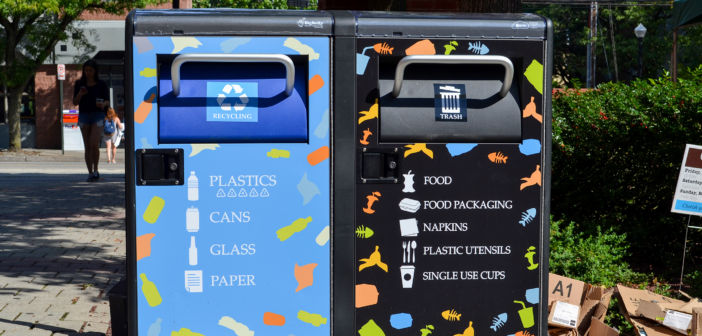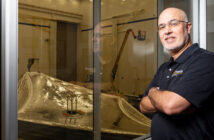When John Hambrose, the communications manager at Waste Management for the greater mid-Atlantic area, sees a greasy pizza box in a recycling bin, his blood boils.
Oils and detergents are contaminants that can spoil an entire bail of recycling.
“In some communities, the contamination could come close to 35 percent by volume,” Hambrose said.
In the Lehigh Valley, contaminated bails are one of recycling’s biggest impediments. The COVID-19 pandemic has illuminated additional concerns, but technological innovation in recycling flexible plastics offer a glimmer of hope for the future.
“What we have seen is a significant increase in trash and recycling due to COVID-19 stay-at-home orders,” said Ann Saurman, manager of the Allentown Bureau of Recycling and Solid Waste. “Trash and recycling that used to be collected from restaurants, schools, businesses and office buildings changed from being collected at those facilities to the residential curbside trash and recycling program.”
According to Tiffany Macauley, a public relations and marketing manager at Cougle’s Recycling, much of that was due to nonessential businesses shutting down, restricting staff and curtailing operation hours.
“Unfortunately, we find that most residential recyclers do a very poor job following recycling instructions,” Macauley said.
Since businesses have begun to reopen, there has been a recovery in industrial recycling, Macauley explained, but the quantity of residential material received remains contaminated and higher than pre-pandemic rates.
Around the valley, recycling processors have been looking for ways to minimize contamination and handle more recyclables.
“Improving efficiencies and being able to sort material by type in a faster and cleaner way, all while pulling out contamination, is the continuous goal,” Saurman said.
According to Cindy Oatis, the recycling and solid waste coordinator for Palmer Township, Pennsylvania, J.P. Mascaro and Sons’ TotalRecycle applied for a grant from Materials Recovery for the Future (MRFF) which provided the funding for the research and technology to implement flex-plastic recycling at their facility. Now, they can recycle water bottle case wrap, shrink film and grocery bags.
A study conducted by MRFF said flexible plastic packaging is the fastest-growing category of plastic packaging, with 12 billion pounds consumed annually in the U. S. Within one year of the sortation equipment installation the study said,74 percent of the feedstock’s flexible plastic packaging has been captured. As a result, TotalRecycle has reduced its quality control staff by 38 percent.
Unfortunately, most recycling centers do not accept flexible plastics and many of these items are difficult to recycle because they fall into the cracks and crevices of the sorting machinery. Consequently, according to the Natural Resources Defense Council website, more than 90 percent of all plastic isn’t recycled. Instead, it ends up in landfills or being incinerated into the air.
Other processors are taking a similar approach. Cougle’s Recycling is upgrading its equipment by adding artificial intelligence robotics and sorting equipment to make the recycling process more efficient and effective, Macaulay said. It will also help them overcome one of their largest issues, which is finding consistent, reliable employees for positions that can be rather monotonous and unappealing, she added.
However, after the recycling gets sorted, it isn’t always processed in the U. S.
“In recent history, a lot of the paper and cardboard we recycle has been shipped overseas to be reprocessed, but lately we have seen more mills in the U.S. get up-and-running, taking the paper and turning it into new products,” Hambrose said.
Although Hambrose said that they were just shipping their waste overseas, according to The Morning Call, his company, Waste Management, which has a recycling plant in Northampton, Pennsylvania, sent more than 25 percent of its recyclables to China in 2017. However, in 2018, China stopped importing mixed paper and plastic – a policy shift that caused U.S. recycling processors to look for new buyers.
The loss of China as an overseas dumping ground means that plastics, paper and glass that are supposed to be recycled are instead being sent to domestic landfills or incinerators. At Cougle’s Recycling in Hamburg, Pennsylvania, if they really cannot find a buyer for something, the company just burns it for fuel.
Such incinerators are typically located in or near front-line communities. “Front-line communities… are those historically harmed by the energy system and are most often are Indigenous communities, communities of color and low-income population,” The 2021 Bethlehem Climate Action Plan said. This new recycling reality risks increasing plumes of toxic pollution that have already threatened local Black and Latinx communities who live near dumping sites in the Lehigh Valley.






Comment policy
Comments posted to The Brown and White website are reviewed by a moderator before being approved. Incendiary speech or harassing language, including comments targeted at individuals, may be deemed unacceptable and not published. Spam and other soliciting will also be declined.
The Brown and White also reserves the right to not publish entirely anonymous comments.